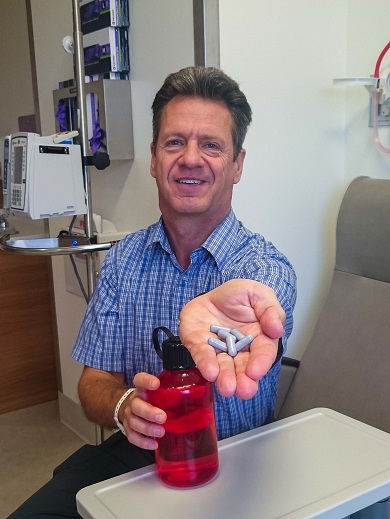I needed better information about clinical trial options
Matthew Fogarty has spent almost five years regularly travelling to the other side of the world to collect the handful of pills that keep his blood cancer at bay.

After running out of proven, effective treatment options in Australia for his rare type of leukaemia, the 56-year-old stumbled across a clinical trial in America recruiting people to test a drug called ibrutinib, which wasn’t available in Australia at the time.
The father-of-three applied for entry to the trial and was accepted.
Nearly half a decade later, he has spent more than $100,000 of his own money travelling from his home in Perth to Washington DC every 12 weeks to pick up his next dose of the life-saving medicine.
“It’s been a miracle drug for me and may well have saved my life,” he said.
“I believe I’m the only person in the world with this type of blood cancer who has achieved complete remission on ibrutinib.”

“I hope other people like me have an opportunity to try this drug as soon as possible.”
Matt says he had access to the treatment options of his choice after he was diagnosed in 2004, but each time was unable to achieve full remission.
He felt his only option left was to try ibrutinib via Australia’s compassionate access program.
However, his application was declined because “there wasn’t enough evidence to prove ibrutinib could successfully treat this type of blood cancer”.
He added: “I’m disappointed no one thought to tell me about the clinical trial in the US, or even suggest I look.
I discovered it myself on Google and contacted the trial doctors myself.
Surely, I could have been given better information about clinical trial options at that time.
“The financial and psychological impact of the relentless international travel has been substantial, and I’m very fortunate to have had the support I needed from my family to get me through it. I realise not everyone is as lucky as I am.
“If there were more clinical trials here in Australia, it would open up access for many more people and potentially make a huge difference to their quality of life.”
Last updated on January 3rd, 2023
Developed by the Leukaemia Foundation in consultation with people living with a blood cancer, Leukaemia Foundation support staff, haematology nursing staff and/or Australian clinical haematologists. This content is provided for information purposes only and we urge you to always seek advice from a registered health care professional for diagnosis, treatment and answers to your medical questions, including the suitability of a particular therapy, service, product or treatment in your circumstances. The Leukaemia Foundation shall not bear any liability for any person relying on the materials contained on this website.